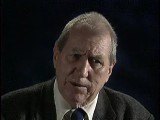
Oral History
Browse an alphabetical list of survivors’ oral histories. These interviews describe firsthand accounts and personal experiences during the Holocaust and World War II.
<< Previous | Displaying results 1-10 of 33 for "Oral History" | Next >>
-
Rachel Mutterperl Goldfarb describes how partisans obtained weapons from German soldiers
Oral HistoryThe Germans established a ghetto in Dokszyce in late 1941. Rachel hid during the liquidation of the ghetto in 1942, and she and her mother escaped to another ghetto. When the second ghetto was about to be liquidated, they escaped again. Rachel and her mother joined a band of partisans in the forest. She helped her mother to cook, and also cleaned weapons. Rachel and her mother tried to leave Europe when the war ended. They eventually arrived in the United States, in 1947.
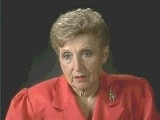
-
Rachel Mutterperl Goldfarb describes partisan attacks on Germans
Oral HistoryThe Germans established a ghetto in Dokszyce in late 1941. Rachel hid during the liquidation of the ghetto in 1942, and she and her mother escaped to another ghetto. When the second ghetto was about to be liquidated, they escaped again. Rachel and her mother joined a band of partisans in the forest. She helped her mother to cook, and also cleaned weapons. Rachel and her mother tried to leave Europe when the war ended. They eventually arrived in the United States, in 1947.
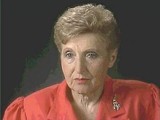
-
Raszka (Roza) Galek Brunswic describes a roundup in the Warsaw ghetto and her escape from deportation
Oral HistoryRoza's family moved to Warsaw in 1934. She had just begun college when Germany invaded Poland in 1939. In 1940, the Germans sealed the Warsaw ghetto, where her parents were shot during a roundup. Roza escaped and went into hiding. From her hiding place she saw the burning of the ghetto in the 1943 uprising. She had false papers stating she was a Polish Catholic (Maria Kowalczyk), and was deported by cattle train to Germany in June 1943. She worked on a farm until liberation in 1945.
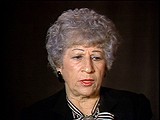
-
Raszka (Roza) Galek Brunswic describes her decision, while posing as a Polish Catholic, to work on a farm in Germany
Oral HistoryRoza's family moved to Warsaw in 1934. She had just begun college when Germany invaded Poland in 1939. In 1940, the Germans sealed the Warsaw ghetto, where her parents were shot during a roundup. Roza escaped and went into hiding. From her hiding place she saw the burning of the ghetto in the 1943 uprising. She had false papers stating she was a Polish Catholic (Maria Kowalczyk), and was deported by cattle train to Germany in June 1943. She worked on a farm until liberation in 1945.
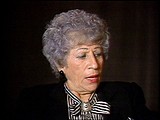
-
Rene Slotkin describes experiencing antisemitism in school in postwar Kosice
Oral HistoryRene and his twin sister Irene were born Rene and Renate Guttman. The family moved to Prague shortly after the twins' birth, where they were living when the Germans occupied Bohemia and Moravia in March 1939. A few months later, uniformed Germans arrested their father. Decades later, Rene and Irene learned that he was killed in the Auschwitz camp in December 1941. Rene, Irene, and their thier mother were deported to the Theresienstadt ghetto, and later to Auschwitz. There, the twins were separated and…
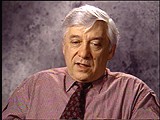
-
Rene Slotkin describes medical experiments at Auschwitz
Oral HistoryRene and his twin sister Irene were born Rene and Renate Guttman. The family moved to Prague shortly after the twins' birth, where they were living when the Germans occupied Bohemia and Moravia in March 1939. A few months later, uniformed Germans arrested their father. Decades later, Rene and Irene learned that he was killed in the Auschwitz camp in December 1941. Rene, Irene, and their thier mother were deported to the Theresienstadt ghetto, and later to Auschwitz. There, the twins were separated and…
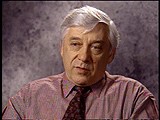
-
Renee Schwalb Fritz describes her experience as a Jewish child hiding in a Catholic convent
Oral HistoryRenee's father left for the United States in 1939. Before Renee and her mother could join him, they had to flee to Belgium to escape the repression of Jews in Austria. The Germans occupied Belgium in 1940. Renee was hidden in a convent for two years, until the Germans became suspicious. The underground took Renee to a Protestant family's farm, and then to an orphanage. After the war she was reunited with her mother, who had survived Auschwitz. Five years later they joined her father in the United States.
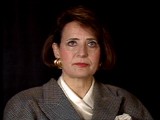
-
Rifka Muscovitz Glatz describes emotions surrounding the establishment of the state of Israel
Oral HistoryRifka was raised in a religious family in Debrecen. In the early 1940s, her family moved to Cluj (Kolozsvar) in Northern Transylvania, annexed to Hungary from Romania in 1940. In 1944, she and her family were forced to leave their house in Cluj. They were rounded up by Hungarian troops helping the Nazis and taken to a brick factory where they stayed for a month. In June 1944, Rifka was transported to the Bergen-Belsen concentration camp. Eight months later she was transported to Switzerland. She sailed to…
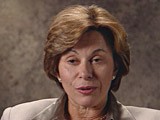
-
Rifka Muscovitz Glatz describes living on a kibbutz and dealing with language barriers
Oral HistoryRifka was raised in a religious family in Debrecen. In the early 1940s, her family moved to Cluj (Kolozsvar) in Northern Transylvania, annexed to Hungary from Romania in 1940. In 1944, she and her family were forced to leave their house in Cluj. They were rounded up by Hungarian troops helping the Nazis and taken to a brick factory where they stayed for a month. In June 1944, Rifka was transported to the Bergen-Belsen concentration camp. Eight months later she was transported to Switzerland. She sailed to…
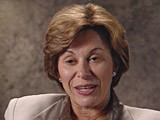
-
Robert Mills Donihi describes a Buchenwald survivor who became a witness at a postwar US trial in Germany
Oral HistoryIn 1945, Robert Mills Donihi was practicing law in Nashville, Tennessee. He accepted a government assignment to Tokyo where he worked on the trial of 28 high-ranking Japanese officers. After a year, he left for Germany, and arrived in Nuremberg in January 1947. Donihi was a member of the legal team at the postwar US trials in Germany, serving as both an interrogator and a prosecutor.
